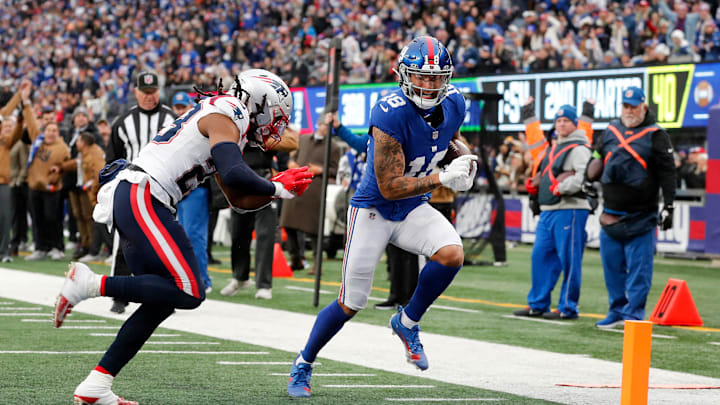The New England Patriots may have a disgruntled player on their hands in safety Kyle Dugger. It reportedly has irked Dugger that he was slapped with the Transition Tag and not signed to a long-term extension. He has a right to feel that way if he wants to. But how should the Patriots handle this situation?
The team has options. One is just to ignore the player's sentiment, pay him the $13M in 2024 and move on to other business. Another is to grant him his long-term extension if that's doable without bankrupting the team and the new program (if there actually is one). Additionally, the team can try to move the player on. More on that later.
The fact is the Transition Tag and its concomitant huge $13.8 price tag was a mistake by the team in the first place. It now has an opportunity to right that wrong and use those funds in a better fashion and on a better player. Let's explore how and why.
The Patriots are way overpaying Kyle Dugger as it is
The Patriots used the Transition tag on safety Kyle Dugger which allows him to negotiate with other teams and affords the Pats' the opportunity to match any deal he receives. Along with the tag, went a truly lavish sum of $13.8M salary on a one year deal.
The first thing about all this is that Dugger is a good player, at times maybe very good, but really good or great he is not. Dugger was way overpaid at that amount. The argument here all offseason is that cap money should be aggregated and spent on improving. That means getting better when you spend your available cap funds.
Eliot Wolf hasn't taken that approach, quite the opposite. In his on-the-job-training offseason, he has mostly continued the Bill Belichick method of spreading a good deal of cash around on backup or depth-level players. (Again, Dugger isn't one of those, just overpaid.) It didn't work for Belichick and won't for Wolf either. The mantra for his team and any team for that matter is to sign and draft really good players, and then scout the rest.
Wolf hasn't signed any really good players in free agency and he now has only the draft to bail him out. Dugger can help him if he trades him for value in the upcoming draft. As a good player, he should fetch maybe a third-round pick (unlikely) or perhaps a fourth and a sixth. Even a fourth alone would be solid.
More reasons why trading Dugger makes good sense
That draft capital will be helpful to the Pats who at present have only seven picks in the upcoming NFL draft at their disposal to almost totally rebuild a shoddy offense. Opportunity may be knocking for Eliot Wolf and he should answer the door and welcome it with open arms.
Another good reason to trade Dugger before the draft is that Wolf has his replacement already in the fold in Julius Peppers. A pick received and/or Dugger himself could be used along with other considerations in a trade with a team looking for cap space, for a truly top player, e.g. a No. One wide receiver to improve the lackluster offense.
Also, when he was drafted in 2020 in the second round, Dugger was already 24 years old. He's now 28, not a younger player you'd want to invest a big amount on in a long-term extension. While he had a solid year in 2023 with 109 tackles, he didn't have an interception or a forced fumble.
Those are a few reasons why Kyle Dugger's dissatisfaction can be an opportunity for Eliot Wolf and maybe not at all disadvantageous. He should take it, trade Dugger for a draft pick or picks, or as part of a big deal for a really top player. With any of these trades, he can move on from his misguided $13.8M overpayment for Dugger which was a huge mistake.
They say, "Don't look a gift horse in the face". This is a gift to Eliot Wolf, a second chance of sorts. Let's see if he is savvy enough after his initial gaffe to willingly accept it. After all, it seems like he didn't think it wise to offer Dugger an acceptable long-term extension anyway. Yet, unfortunately, since he placed the Transition Tag, with it's big salary initially on the table on Dugger, the guess here is that he won't. We'll see.
